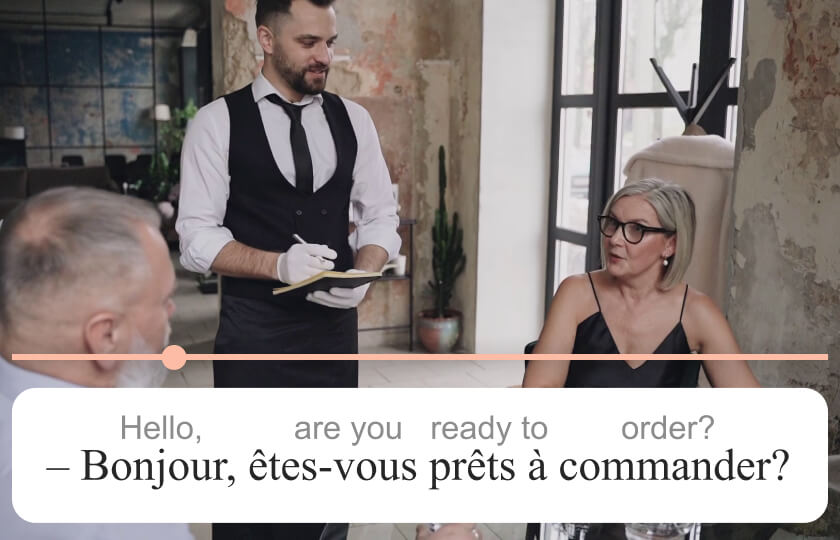
Did you know you already speak a little French? That’s right — English speakers unknowingly use loads of French words in their daily lives. From reading a “menu” to parking in a “garage,” French words have woven their way into English vocabulary.
In fact, about 30% of English words have French origins. That’s a huge overlap, making French one of the most significant contributors to the English language. And here’s the kicker: many of these words are used so naturally that they don’t feel French at all.
So, how did French leave such a lasting mark, and where do we see its influence most? Let’s find out!
Why are there so many French words in English?
The main reason for all the French words in English is the Norman Conquest of 1066. When the Normans took over England, they brought their language — Old French — with them. For centuries, it was the language of law, administration, and the upper class.
This influence trickled down to everyday language, mixing French words with Anglo-Saxon ones. Sometimes, both versions remained, like “commence” (French) and “start” (Germanic), or “beverage” and “drink”. French words often sounded fancier, giving them a formal edge in English, even today.
Common French words and phrases used in English
French words in English appear in nearly every part of life, from food and fashion to art and everyday things. Let’s take a closer look at these words.
Food
| Word/Phrase | Meaning |
| À la carte | Menu items ordered separately |
| À la mode | French: Cooked with wine and carrots English: Served with ice cream |
| Alcool | Alcohol |
| Apéritif | Pre-dinner drink |
| Aubergine | British English: Eggplant |
| Béchamel | Mixture of butter, milk, and flour |
| Bisque | Creamy soup, usually with seafood |
| Bon appétit | Enjoy your meal |
| Café | Coffee or coffee shop |
| Cordon bleu | Dish prepared to a high standard or great chef |
| Cornichon | British English: Pickle |
| Courgette | British English: Zucchini |
| Champagne | White sparkling wine |
| Crème brûlée | Dessert made of custard topped with caramelized sugar |
| Croissant | Crescent-shaped pastry |
| Crouton | Toasted or fried pieces of bread |
| Gâteau | British English: Cake |
| Hors d’œuvre | Small appetizer |
| Menu | List of dishes |
| Mille-feuille | Layered pastry dessert |
| Omelette | Egg dish |
| Profiterole | Cream-filled pastry topped with chocolate |
| Restaurant | Place where meals are served |
| Roux | Mixture of flour and oil used as a cooking base |
| Salade | Dish of mixed vegetables |
| Sauté | Fried in a small amount of oil |
| Soufflé | Light, fluffy baked dish |
| Soupe | A liquid dish of boiled ingredients |
| Tartine | Bread with spread or topping, often served for breakfast |
| Vinaigrette | Salad dressing |
Fashion and beauty
| Word/Phrase | Meaning |
| Armoire | Wardrobe or closet |
| Blouse | Loose-fitting top |
| Bonnet | French: Winter hat English: Old-fashioned hat |
| Bracelet | Jewelry worn around the wrist |
| Boutique | Small, often independent shop |
| Chapeau | Hat |
| Chic | Stylish, elegant |
| Cologne | Perfume |
| Costume | Outfit to dress like someone else |
| Couture | French: Sewing English: Fashion |
| Décolleté | Garment with a low-cut neckline |
| Eau de toilette | Perfume |
| Faux | Fake (e.g. fur) |
| Haute couture | High fashion |
| Lingerie | Female underwear |
| Mayonnaise | Creamy condiment made from egg yolks and oil |
| Petite | Short, small |
| Prêt-à-porter | Ready-to-wear fashion |
| Porc | Meat from a pig |
| Robe | French: Dress English: Long, loose gown |
| Sauce | Liquid or semi-liquid condiment |
| Sans fard | French: Without foundation English: Without makeup |
| Silhouette | Outline or shape |
Art and culture
| Word/Phrase | Meaning |
| Art Nouveau | A decorative art style from the late 19th to early 20th centuries |
| Avant-garde | Cutting-edge, innovative |
| Ballet | Classical type of dance |
| Bas-relief | Sculptural relief with shallow depth |
| Cliché | Overused idea or phrase |
| Film noir | Dark-themed movie genre |
| Genre | Category or type of artistic work |
| Littérature | Literature |
| Papier mâché | Paper pulp mixed with glue, used for art |
| Télévision | Television |
| Théâtre | Theater |
Places
| Word/Phrase | Meaning |
| Arcade | French: Covered street with shops English: Place to play video games |
| Boulevard | Wide avenue |
| Chalet | Wooden house, often in a mountain setting |
| Cinéma | Movie theater or movies |
| Cul-de-sac | Dead-end street |
| Garage | Covered parking or car repair workshop |
| Hôtel | A place for lodging and services |
People and professions
| Word/Phrase | Meaning |
| Attaché | Person who works in an embassy |
| Au pair | Young person assisting with childcare abroad |
| Bon vivant | Someone who enjoys the good life, especially food and leisure |
| Charlatan | Person who pretends to have skills or knowledge they lack |
| Chauffeur | Driver |
| Chef | French: Cook English: Head cook |
| Concierge | Hotel staff member providing assistance to guests |
| Connaisseur | Expert in matters of taste |
| Entrepreneur | Someone who starts and runs their own business |
| Femme fatale | Seductive woman whose charm often leads to trouble for others |
| Fiancé | French: Engaged man (fiancé) or woman (fiancée) English: Engaged person |
| Maître d’hôtel | French: Hotel manager English: Head waiter |
| Nouveau riche | Recently wealthy, often implying a flashy lifestyle |
| Protégé | French: Protected person or one under mentorship English: Someone mentored by another |
| Sommelier | Wine steward |
| Voyeur | Prying observer, often in a sexual context |
Other common words
| Word/Phrase | Meaning |
| Adroit | Dexterous, skillful |
| Apostrophe | Punctuation mark |
| Au contraire | On the contrary |
| Beau | French: Handsome or beautiful English: Handsome or a boyfriend |
| Blond | Light yellow hair color |
| Brunette | Woman with brown hair |
| Bizarre | Strange or unusual |
| Bouquet | Bunch of flowers |
| Bourgeois | Upper middle class |
| Bon voyage | Have a good trip |
| Bureau | French: Desk or office English: Office or government department |
| Capitalisme | Economic system based on private ownership and profit |
| Carte blanche | Permission to act freely |
| Certain | Definite, positive |
| Content | Happy, satisfied |
| Constitution | Written system of fundamental principles |
| Courage | Bravery |
| Coup d’état | Overthrow of a government |
| Crème de la crème | The best of the best |
| Critique | Detailed evaluation |
| Cruel | Hurtful |
| Décor | Layout and furnishing of a room or place |
| Début | French: Beginning or first appearance English: First public appearance or performance |
| Débris | Scattered fragments or remains |
| Déjà vu | Feeling of having already experienced something |
| Détour | A deviation from the usual route or path |
| Du jour | Of the day |
| Élite | A select group regarded as superior |
| En garde | On guard |
| En route | On the way |
| Excusez-moi | Excuse me |
| Façade | Front of a building or false exterior |
| Faux pas | Social blunder |
| Force majeure | Overpowering, unforeseen event |
| Grave | Serious or solemn |
| Hommage | Act of paying respect or tribute |
| Je ne sais quoi | Indescribable quality |
| Joie de vivre | Joy of living |
| Laissez-faire | Let things happen without interference |
| Long | Lengthy |
| Liaison | Connection or affair |
| Ménage à trois | Romantic relationship involving three people |
| Milieu | Social environment or setting |
| Mirage | Illusion |
| Nom de plume | Pen name for a writer |
| Orange | Fruit or color |
| Occasion | Opportunity or event |
| Par excellence | Ideal, ultimate |
| Possible | Capable of being done |
| Première | French: First, or first performance English: First performance |
| Queue | French: Line or tail English: Line |
| Rendez-vous | Meeting or appointment |
| Réservoir | Collection or storage area (e.g., for water) |
| Ridicule | Laughable or absurd |
| RSVP | Répondez s’il vous plaît (please respond) |
| Sabotage | Deliberate destruction or tampering |
| Sans | Without |
| Savoir-faire | Social skill or tact |
| Sentiment | Feeling or emotion |
| Simple | Plain or naive |
| Soirée | French: Evening party or evening English: Evening party |
| Souvenir | Keepsake or memory |
| Technique | Method or skill used to achieve something |
| Tête à tête | Private conversation between two people |
| Touché | Acknowledgment of a good point or counterpoint |
| Uniforme | Uniform |
| Voilà | There it is or there you go |
Wrapping up
French words have woven themselves seamlessly into the English language, showing up in everything from what we eat to how we dress, talk, and even think.
This connection isn’t just fascinating — it’s also practical if you’re thinking about learning French. You already know thousands of terms, which means you’ll need to learn far less vocabulary compared to many other languages.
So, the next time you enjoy a croissant, compliment something chic, or avoid a faux pas, take a moment to appreciate the French influence on your everyday life. Bonne chance!
